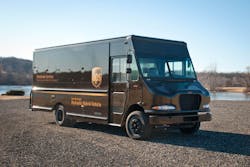UPS to deploy hydraulic hybrids
UPS will add 40 hydraulic hybrid vehicles (HHV) in Baltimore and Atlanta before the end of the year. The vehicles, developed by Freightliner Custom Chassis Corp. (FCCC) and Parker Hannifin Corp., are said to achieve up to 35% in fuel economy improvements and a 30% reduction in CO2 emissions over diesel-powered vehicles using automatic transmissions.
Both cities will receive 20 of the vehicles. The HHVs will be put into operation immediately in Baltimore with the Atlanta rollout to follow before the end of the year, UPS said. Grants from the U.S. Dept. of Energy’s Clean Cities program helped offset some of the costs of the deployment.
“Our long-term goal is to minimize our dependence on foreign energy and one way we will get there is through the deployment of a wide variety of technologies and designs in our fleet,” said Mike Britt, UPS director of alternative fuel vehicle engineering. “As early adopters of this technology, we are very pleased with the significant fuel economy and emission reductions that come from the HHVs.”
The HHVs operate on two power sources – a fuel-efficient diesel combustion engine and advanced series hydraulic hybrid. Energy created by the vehicle’s continued braking action is stored in a hydraulic high-pressure accumulator, similar to what is done with electric motors and batteries in a hybrid electric vehicle. The HHV has a function to turn off the engine and drive the vehicle using the stored energy to propel the vehicle. This engine off strategy can reduce up to 90 min. of engine run time in a typical route, UPS said.
“We are proud to be a part of this exciting implementation to UPS’s fleet,” said Shane Terblanche, general manager for Parker's Hybrid Drive Systems Division. “We fully anticipate that Parker's Hydraulic Hybrid technology for package delivery will provide outstanding bottom line results and support UPS’s commitment towards a sustainable future.”
